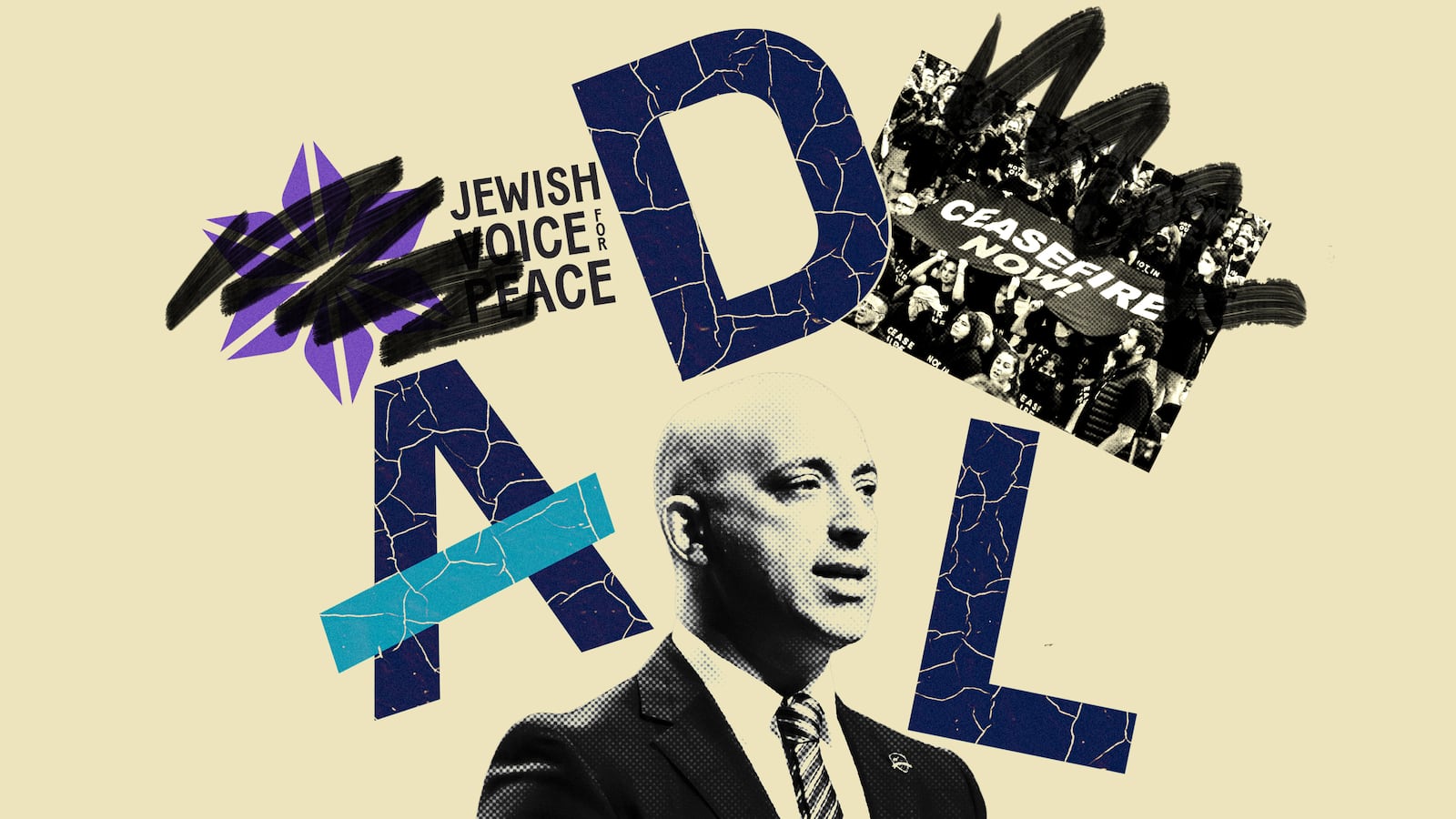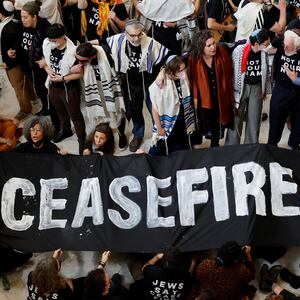When Elon Musk endorsed an antisemitic conspiracy theory on X (formerly Twitter) last Wednesday, major advertisers fled the site. But when, amid the advertiser exodus, Musk tweeted two days later that the terms “decolonization” and “from the river to the sea” implied genocide toward Israelis, an unlikely CEO came to his support.
“This is an important and welcome move by @elonmusk,” Jonathan Greenblatt, CEO of the Anti-Defamation League posted on Friday. “I appreciate this leadership in fighting hate.”
Greenblatt’s comments—the same day as a Twitter advertiser exodus—raised eyebrows among onlookers, who noted that Musk had endorsed an antisemitic conspiracy theory days earlier and that Greenblatt leads an organization dedicated to combating antisemitism.
But some former ADL staffers were not surprised. In the weeks before Greenblatt’s Friday remarks, multiple recent ADL employees told The Daily Beast that the organization has been riven with internal dissent over Zionism, the core political movement for the establishment of a Jewish state in Israel. Since at least 2021, former staff said, Greenblatt has increasingly positioned the ADL as a Zionist organization, equated anti-Zionism with antisemitism, and—since the outbreak of war in Gaza—called for pro-Palestinian groups to be banned and investigated for providing material support for foreign terrorist organizations.
Multiple former ADL staffers, speaking on condition of anonymity, said they worry the ADL is risking its own reputation as a reliable source on issues like white supremacy. Meanwhile, leaders of Jewish-led pro-Palestinian groups say the ADL’s stance puts them in serious legal jeopardy. And the ADL’s outward position on Palestine has put the organization at odds with other civil rights groups, with some current members expressing unwillingness to work with the ADL in the future.
“When an organization is so biased on something so pronounced like this, I think it definitely taints the rest of the organization,” one former ADL employee told The Daily Beast of the organization’s stance on Zionism.
Reached for comment, an ADL spokesperson said the organization regards anti-Zionism as a form of antisemitism.
“ADL’s mission is to call out antisemitism and extremism wherever it occurs, whether on the far right or radical left,” the spokesperson said.
“Our North Star is the fight against antisemitism, not the winds of political activism. To be clear, at ADL we firmly believe that anti-Zionism is antisemitism. This could not have been made clearer on Oct. 7, when Hamas massacred 1,200 people, raping women and killing parents in front of their children. In the aftermath of those horrific atrocities and others, Jews and Zionists around the world have been forced to endure a tsunami of antisemitic incidents and violent assaults because of their perceived or actual support for Israel. Anti-Zionism is often expressed, explicitly or implicitly, in the rejection of Jewish nationhood and the right to self-determination. Anti-Zionists often single out Israel alone for condemnation, with their opposition couched in terms that delegitimize the very existence of the Jewish state. That is antisemitism – full stop.”
But not all Jewish people and not all ADL employees are Zionists.
Several recent ADL employees connected the ADL’s current divisions to a May 2021 speech in which Greenblatt announced that “antizionism is antisemitism,” and pledged to “apply more concentrated energy toward the threat of radical antizionism” from left-leaning and pro-Palestinian groups that he described as “the Radical Left, the photo inverse of the Extreme Right that ADL long has tracked.”

Protesters hold a demonstration in support of a ceasefire in Gaza in the Cannon House Office Building on October 18, 2023 in Washington, DC.
Alex Wong/Getty ImagesAt the time, some then-staffers objected to Greenblatt’s announcement, “not in spite of their Jewish identity,” a different former staffer told The Daily Beast, “but because of it and how Jewish history and the values they get from their faith compel them to identify with the violence and trauma inflicted on Palestinians.”
But that former employee and others said their dissent was not well received. “There was no space for any real conversation, as an organization, on what that stance was,” another said. “We would be told as employees, if that’s something that we disagreed on ethically or morally, then we can leave and find another place of employment.”
The ADL spokesperson told The Daily Beast that “it is not uncommon for there to be internal disagreements and dissent at an organization as large and as storied as ADL,” and that the organization has been “flooded with resumes” from prospective employees since Oct. 7. More than two dozen law firms have also asked to support the ADL since Oct. 7, and “more than 200 major companies and corporations have signed on to the ADL Workplace Pledge Against Antisemitism,” the spokesperson added.
Still, some employees who sat through Greenblatt’s 2021 remarks voiced concern that the ADL’s new work on anti-Zionism would obscure its work tracking violent extremism.
“If the lines have shifted in terms of what constitutes antisemitism, that’s gonna impact the credibility of your content,” a fourth recent ADL employee told The Daily Beast.
Since the Oct. 7 attack on Israel by Hamas, and Israel’s subsequent war in Gaza, the ADL has included pro-ceasefire rallies in its roundups of antisemitic activity, the Intercept reported this month. The roundup includes pro-ceasefire rallies by groups like Students for Justice in Palestine (SJP) and Jewish Voice for Peace (JVP), listing them alongside recent hate incidents like activity by a neo-Nazi group, a bomb threat at a synagogue, and a slur shouted at a Jewish family.
Former ADL staff said the decision to categorize those rallies as antisemitic risks the integrity of the ADL’s data on hate. “In my opinion, it taints it,” a recent employee said. “Because you’re adding what is essentially a political opinion or a political viewpoint to a dataset that historically has been very secular, in the sense that it has been extremely black and white and the methodology of it has been very clear.”
The ADL has also supported bans on pro-Palestinian groups, on the grounds that they allegedly support terrorism. “We long have said that these are hate groups, the photo inverse of white supremacists,” Greenblatt tweeted last month of the group Jewish Voice for Peace (JVP), which is critical of Israel and has led protests calling for a ceasefire in Gaza.
On Oct. 26, the ADL published an open letter to the presidents of nearly 200 universities, urging them to investigate the group Students for Justice in Palestine (SJP) for “potential violations of the prohibition against materially supporting a foreign terrorist organization.” (Material support for a foreign terrorist organization is a serious felony charge—and one unsupported by any evidence in the open letter, fellow civil rights organizations noted.)
This month, the ADL thanked Columbia University for suspending its chapters of the JVP and the SJP. Tallie Ben Daniel, managing director of JVP, said the ADL’s opposition has put her group’s largely college-age Jewish membership at risk.
“Our students are incredibly ethical people,” Ben Daniel told The Daily Beast. “All they want is for human rights and international law to be respected in Israel and Palestine. And college administrators see them with such intense suspicion. So there’s a huge chilling effect that prevents them from expressing themselves on college campuses, because administrators are so concerned about what they’re hearing about these organizations from the ADL.”
The ADL’s comments about pro-Palestinian groups have put it in opposition to other civil rights groups.

Students participate in a protest in support of Palestine and for free speech at Columbia University campus on November 14, 2023 in New York City.
Photo by Spencer Platt/Getty ImagesIn its own letter to university leaders this month, the American Civil Liberties Union wrote that the ADL “recently issued an open letter to university presidents alleging, without citing to any evidence, that pro-Palestine student groups are, through their words, providing material support to Hamas, a designated Foreign Terrorist Organization, and have urged sweeping investigations into these groups for material support of terrorism.”
The letter went on to state that, while the ACLU does not take positions on other nations’ conflicts, its staff “strongly oppose efforts to stifle free speech, free association, and academic freedom here at home. In the name of those principles, we urge you to reject calls to investigate, disband, or penalize student groups on the basis of their exercise of free speech rights.”
Meanwhile, staff at the Southern Poverty Law Center, a civil rights organization that also monitors extremism, expressed frustration with the ADL’s public stances since Oct. 7. Multiple SPLC staffers, speaking on the condition of anonymity, told The Daily Beast that the ADL’s position had driven a rift between the organizations.
“I see no reason to work with an organization that draws such false equivalencies between actual neo-Nazi terrorists and anti-war student groups,” one SPLC staffer said. “The idea that, as Greenblatt has proposed, student groups ought to be investigated for providing material support for terrorism is such an atrocious and despicable idea to begin with. But to propose that and then still call yourself a civil rights group? It’s unforgivable.”
The SPLC’s union last month issued a statement declaring solidarity with Palestinians. “Palestinian Lives Matter,” the statement read, in part. “Palestinian families matter. Palestinian histories matter. We hold the grief felt by millions in our hearts and feel it in our bodies. We support the ongoing call for a ceasefire and an end to the occupation.”
Another SPLC staffer echoed that call, telling The Daily Beast that “it’s my observation that members of SPLC’s bargaining unit are, broadly speaking, disgusted by ADL and waiting for someone in leadership to have the courage to speak up about the way they are abusing their platform as a civil rights advocacy organization to support Israel’s use of violence.”
The ADL spokesperson described it as “unfortunate that there are those who are attempting to drive a wedge between Jewish communal organizations like ADL, and non-Jewish civil rights organizations due to our policy positions or support for the state of Israel. But that will not stop us from our daily work of fighting antisemitism and extremism; advocating for policy and legislative changes to effectively address hate crimes; and providing anti-bias education to thousands of students across the country. Our work will continue despite any disagreements or criticism – whether it be internal or external; and we will continue efforts to bridge divides and work with good-faith partners in the fight against hate. We may not always get it right, but we will do our best every single day to call out every manifestation of antisemitism or extremism.”
Disputes about the ADL and Greenblatt’s recent stances have become so pronounced in recent weeks that at least one staffer has publicly quit, and one current advisory board member has publicly expressed dissent with the organization.
An ADL researcher, who declined to comment for this story, publicly resigned over the organization’s “messaging” around the war in Gaza last month.
“I couldn’t square my morals and politics with the direction I saw the org going in,” the researcher wrote on social media. “I think that ADL does a lot of great work, and trust me, there are some AMAZING people there (many of whom agree with me…). But there are times when you have to stand up and say ‘enough.’”
And on Saturday, Peter Fox, a member of the ADL’s NextGen Advisory Board penned an article in the Jewish news site The Forward decrying Greenblatt’s praise of Elon Musk. “It was baffling and frankly embarrassing to see you praise Elon Musk for condemning antisemitism on Nov. 17, when just a day prior, he endorsed a tweet spouting the Great Replacement Theory,” Fox wrote.
Fox went on to state that, while he believed in the ADL’s mission, “unfortunately, this time, the ADL’s top leadership was duped.”
Former ADL staff also described themselves as occasionally blindsided by their employer, and that ADL-wide policies sometimes came with little notice from Greenblatt, even at times contradicting other departments at the ADL, or appearing to undercut the organization’s own work against bigotry.
In one instance, the former staffer said, Greenblatt appeared to agree with Fox News when the right-wing media giant accused the ADL’s educational materials of promoting so-called “critical race theory” due to the inclusion of concepts like “structural racism” and “intersectionality.”
The ADL released a statement acknowledging that some of the materials were “misaligned with” the organization’s values, and that the ADL would “launch a thorough review” of its educational content.
“Jonathan threw the education department under the bus,” the former staffer said. “That was done over the heads of comms [communications] department. When the education department asked which materials weren’t in alignment with ADL values, and which values, they never got a satisfactory answer.”
That former staffer and others also alleged internal ADL dissatisfaction over the way the organization has addressed antisemitism and far-right content on X (formerly Twitter).
As X’s new owner, Musk has repeatedly used the platform to promote antisemitic users and signal approval of antisemitic tropes. (On Wednesday, Musk replied “you have said the absolute truth” to a user who claimed Jewish people push “hatred against whites.”)
The ADL has previously documented Musk’s flirtation with the far right and antisemitism. When Musk announced plans to buy Twitter last year, the ADL’s Center on Extremism published an article titled “Elon Musk Plans to Buy Twitter. Right-wing Extremists Rejoice.”
But in a CNBC appearance shortly ahead of Musk’s Twitter purchase last October, Greenblatt suggested that Musk might be a good steward for the site and help it clean up its “toxicity.” “Elon Musk is an amazing entrepreneur, an extraordinary innovator. He’s the Henry Ford of our time,” Greenblatt said in the interview.
The comparison to Ford raised eyebrows within the ADL, former staff said, because Ford was a notorious antisemite. The ADL has devoted significant space on its website to detailing Ford’s role in promoting anti-Jewish bigotry in America. Greenblatt later walked back the analogy, stating that “admittedly, the Henry Ford reference was wrong even though he was an innovator in the automobile industry. I certainly was not trying to praise Ford and didn’t intend to minimize his contemptible antisemitism in any way.”
The former ADL staffers who spoke with The Daily Beast uniformly emphasized that the organization’s researchers produce vital work documenting bigotry, and that the task requires nuance.
“I think the disingenuous equivocation between the antisemitism that does in fact exist in some spaces on the left, and the lethal antisemitism on the right—without recognizing that antisemitism is part of the same system that threatens Muslims and people of color in the U.S.—minimizes the real threat of antisemitism,” one said. “And it contradicts ADL’s own research and data about what the biggest extremist threats are to Jews and to all other marginalized people.”
Despite their objection to some ADL positions, the organization’s former staff, as well as Ben Daniel of the JVP, emphasized that antisemitism remains an acute threat to Jewish people in the U.S.
“What’s happening in this country with white nationalism and QAnon and all of these right-wing movements is really terrifying,” Daniel said. But amid that threat, the ADL is “focusing on college students. They’re focusing on college students calling for human rights.”
And while former staff said objections to Greenblatt’s 2021 speech went unanswered, internal dissent was only delayed.
“It felt like the expectation, for us, was to just ignore it and it would go away,” the former employee said. “I think that was a poor strategy and a poor way to engage with people at ADL because, since 2021, there have been other issues and statements that have been made by Jonathan [Greenblatt] or leadership that have put ADL in similar positions again.
“So it’s not something that can be swept under the rug, in my opinion.”









